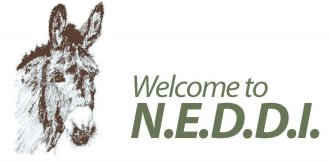Keeping a Donkey as a Pet
Donkeys are the most wonderful animals. They are loving, kind and very gentle – perfect around small children and as a companion to other animals. However, just as with keeping a horse or pony, a donkey can be expensive. Apart from normal day to day care, there are many conditions that can lead to extra costs, especially if the owners do not have much experience with this type of animal. This is where the problems begin and it can reach the stage, especially if the owners do not have sufficient finances, where the donkey will suffer neglect and the results from this can be horrendous. Luckily there are people and centres out there who make donkey welfare a priority. Before buying or adopting a donkey there are many things to consider and it is always best, if you do not have prior experience, to get advice from the experts.
Looking After a Donkey
A donkey has daily needs and a care regime should be put into place as they appreciate a routine. First of all, he or she will need a companion, as just like horses, they are herd animals, and although they can adapt to living alone, they are much happier with company. So if adopting a donkey from a sanctuary, why not take their best friend as well. Their daily needs involve grooming, cleaning and oiling the hooves, feeding, ensuring they have clean bedding and at least once a week, the droppings need to be removed from the pasture to avoid the grass becoming sour. They need their feet trimmed every six to eight weeks and unless you have a lot of experience in doing this, a professional, fully qualified farrier should always be used. They also require an annual vaccination to protect them from equine flu – and worming, a minimum of at least twice a year, with a broad spectrum product, which will get rid of all types of worms, including tapeworms. In return for all this, they will give you unconditional love and friendship and you will wonder how you ever lived without them.
Donkeys and Health Care
One of the main reasons why a donkey will become neglected is because people do not realise the cost and amount of work involved with keeping and generally caring for them and they simply do not have the necessary finances. Most donkeys will remain healthy all their lives, although neglect and malnutrition, in very severe cases, can result in long term problems, which is why it is vital to ensure that you have adequate pet insurance that covers pre-existing conditions, as the chances are you will not know of any previous illnesses. Then, no matter what arises, your donkey will be able to receive the best veterinary care he or she requires. There are many things to consider, but by taking your donkey’s welfare seriously, most can be efficiently dealt with or avoided altogether.
Problems to Look Out For
The main ones are laminitus, colic, lameness, cuts and sores, lung worm, warble and horse flies. Laminitus is generally caused by your donkey eating too much, especially rich spring grass, although overfeeding in general can also be a cause – so the prevention is simple – if you have a large field, section it into smaller parcels, thus restricting the daily intake of your donkey. Laminitus is extremely painful and there is no cure, so prevention is essential.
At the first signs of colic, which can be constant rolling, sweating and a distended stomach – call the vet. Your vet will know that this is an emergency and will come quickly, but while you are waiting, lead your donkey round and do not let him or her lie down as this can result in a twisted gut. Most colics if caught early are easily treated. If more serious, then an operation could be necessary.
With regard to lameness, cuts and sores, keep a basic medicine cabinet with antiseptic and animal lintex which can be used hot or cold as a compress. If you have any doubts – call the vet. It is also essential that lung worm is controlled by your vet with an annual vaccination. Warble and horse flies are a summer problem, easily dealt with by using an effective fly spray for horses.
Your Donkey Needs You
The best place to find your donkey is at a donkey adoption centre. Hopefully you will be able to provide a ‘forever home’, but should your circumstances change, you will know that your precious friend will be able to return to the sanctuary where you will be able to visit. Above all else the welfare of your donkey must come first – the hardest part will be deciding which one to choose.
